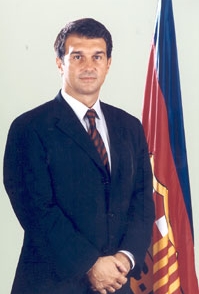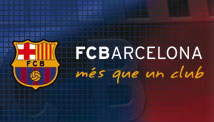Joan Laporta i Estruch (2003-2010)

News article on: Presidents

Joan Laporta i Estruch (2003-2010)
Joan Laporta i Estruch (Barcelona, 1962) became president after a clear victory in the elections held on 15th June 2003. He received 27,138 votes (52.7%), well ahead of Lluís Bassat, who received 16,412 votes, and the other four candidates.
A new generation of young, dynamic directors came into the Club with Laporta and generated a real
shake-up of the Club. They popularized the expression “virtuous circle”, which aimed to
strengthen the Club economically and socially and prepare the ground for a winning team that would
nurture the social dimension of the Club. With this concept as their starting point, the Board
initiated a campaign to recruit new members called “The Great Challenge”, at the same
time proposing to eradicate violent groups from the Camp Nou. Alongside this a number of other
innovative measures were set up, such as holding Board meetings in different parts of Catalonia
while reinforcing communication with the fans through the revitalization of the Barca magazine and
a determined drive to promote the Club’s TV station, which took the name of Barca TV.
In addition, the Foundation embarked on a new phase, characterized by a change of
orientation and became the social identity par excellence of FC Barcelona, the heart and soul of
the Club, with more ambitious objectives and new action programmes. During Laporta’s mandate,
the values which had traditionally characterized Barca were strengthened: Catalan identity,
public-spiritedness, solidarity and universality.
In footballing terms, the first season, with Frank Rijkaard as manager, saw the incorporation
of the Brazilian international Ronaldinho, who raised enormous expectations. The team improved
match by match and finished as runners up in the league. The following season, 2004-2005, featured
the signings of Eto’o and Deco, key elements in winning the league title for the first time
in six years. The expectations raised by that team were confirmed the following season when, as
well as renewing their league title, they also won the Champions League in Paris against Arsenal,
the second European Cup in the Club’s history.
Despite such a successful record, which made the president extremely popular, the law courts
ruled that the first ten days of his mandate, from 20th to 30th June 2003, were equivalent to a
whole season, which forced the Board to call elections in September 2006, at a moment of maximum
popularity having achieved two league titles and the Champions League. Laporta stood for
re-election and received the signatures of 8,994 members backing his candidacy. He was the only
candidate to reach the minimum number and was therefore automatically re-elected.
The 2006-2007 season started with the signing of the agreement with UNICEF, in which the Club
committed itself to collaborate economically and in addition wear the UNICEF logo on the shirts of
the football team. This was an unprecedented move designed to strengthen the strategy of converting
Barca into ‘more than a club’ throughout the world. On a sporting level, the season
witnessed a winding down of previous success; despite winning the Spanish Super Cup, the
elimination from the Kings Cup at the hands of Getafe and the loss of the league in the final
matches created a mood of despondency, which the Board tried to mitigate with the signing of Henry,
followed shortly after by Toure Yaya and Abidal.
In the 2007-08 season, the Club celebrated the 50th anniversary of the Camp Nou and set up an
international competition for the remodelling of the stadium. This was won by the British architect
Norman Foster. At the same time the Club was one of the promoters of the European Clubs Association
(ECA), presided by Karl-Heinz Rummenigge, and of which Joan Laporta became vice-president.
Meanwhile, the season was more disappointing than the previous one and it was soon clear that the
team wasn’t working as it should. Rijkaard’s time had come to an end. Reluctantly,
Laporta had to sack him. Ronaldinho, the player who had symbolized the return of hope in 2003, also
left.
In June 2008, Josep Guardiola was appointed first team manager. The year before he had taken
over the reserve side, Barcelona B, when they were on the verge of promotion to Second Division B.
However, the season was ending in a mood of disappointment and a group of members put forward a
vote of censure against the Board of Directors. They obtained enough support to force the vote on
6th July 2008. 39,389 members voted and 60.6% voted in favour of the vote of censure, a figure
below that of 66.6% required by the statutes to force the resignation of the president. After this
result, eight directors left the Board but president Laporta replaced them and continued in office
and was ratified by the representative assembly in August.
After this complex interlude, the most brilliant season in the history of the club began. The
football first team achieved success in every competition in which they took part, with some
memorable matches such as the 2-6 win in the Santiago Bernabeu. The team won the Kings Cup, then
the league and finally the Champions League against Manchester United in Rome, the third European
Cup in the Club’s history. At the beginning of the next season, this list of titles was
extended to include the Spanish Super Cup, the European Super Cup and the World Club Cup, making
this Barca the team of the Six Cups. The World Club Cup won in Abu Dhabi against Estudiantes de la
Plata (2-1) was the only competition never won before by the Club. President Laporta was then able
to round off his mandate with another league title in the 2009-10 season.
In short, in Joan Laporta’s seven years as president, the football team won the World
Club Cup, two European Cups, the European Super Cup, four league titles, the Kings Cup, three
Spanish Super Cups and three Copes Catalunya. In the economic and social areas, the figures speak
for themselves. The annual budget increased from 170 to 445,5 million euros and the membership rose
from 106,135 to 173,701.
FC Barcelona History
More than a Club
Corporate information
Official sponsors
Copyright - FCBarcelona | Legal Terms | Buy tickets FC Barcelona | This is the FC Barcelona official website

